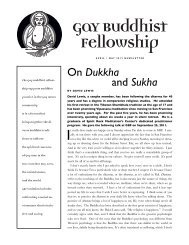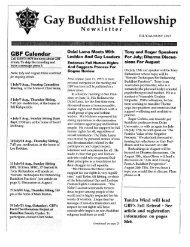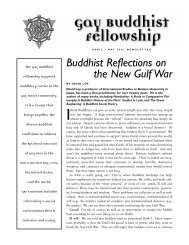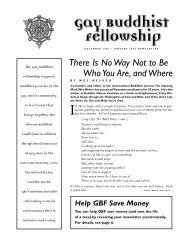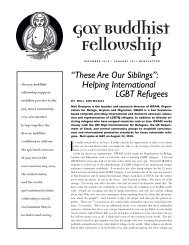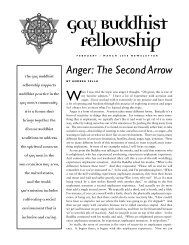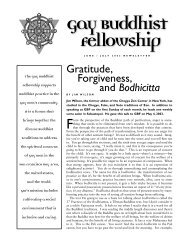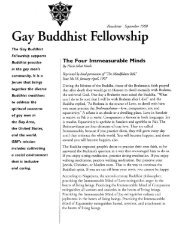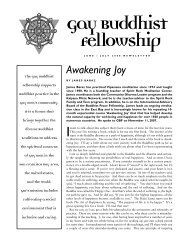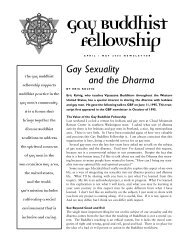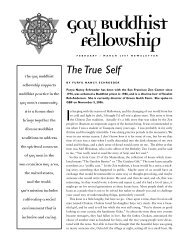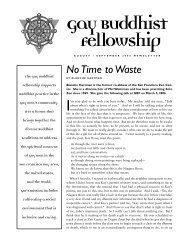2008.08 Joanna Macy (In a Dark Time, the Eye Begins to See).pdf
2008.08 Joanna Macy (In a Dark Time, the Eye Begins to See).pdf
2008.08 Joanna Macy (In a Dark Time, the Eye Begins to See).pdf
Create successful ePaper yourself
Turn your PDF publications into a flip-book with our unique Google optimized e-Paper software.
Gay Buddhist<br />
Fellowship<br />
A U G U S T / S E P T E M B E R 2 0 0 8<br />
N E W S L E T T E R<br />
The Gay Buddhist<br />
Fellowship supports<br />
Buddhist practice in <strong>the</strong><br />
Gay men’s community.<br />
It is a forum that<br />
brings <strong>to</strong>ge<strong>the</strong>r <strong>the</strong><br />
diverse Buddhist<br />
traditions <strong>to</strong> address<br />
<strong>the</strong> spiritual concerns<br />
of Gay men in <strong>the</strong><br />
San Francisco Bay Area,<br />
<strong>the</strong> United States,<br />
and <strong>the</strong> world.<br />
GBF’s mission includes<br />
cultivating a social<br />
environment that is<br />
inclusive and caring.<br />
“<strong>In</strong> a <strong>Dark</strong> <strong>Time</strong>,<br />
<strong>the</strong> <strong>Eye</strong> <strong>Begins</strong> <strong>to</strong> <strong>See</strong>”<br />
BY JOANNA MACY<br />
Eco-philosopher and visionary <strong>Joanna</strong> <strong>Macy</strong> has developed an international following<br />
over <strong>the</strong> course of 40 years as a speaker and workshop leader on Buddhism,<br />
general systems <strong>the</strong>ory, and deep ecology. A respected voice in movements<br />
for peace, justice, and ecology, she interweaves her scholarship with<br />
four decades of activism. She is author of many books including Thinking Like<br />
a Mountain, World as Lover, World as Self, and Coming Back <strong>to</strong> Life: Practices <strong>to</strong><br />
Reconnect Our Lives, Our World. She gave <strong>the</strong> following dharma talk at GBF on<br />
February 17, 2008.<br />
Asked for a title, right off I said, though I’ve never given a talk with that title<br />
before, “<strong>In</strong> <strong>the</strong> <strong>Dark</strong>ness, <strong>the</strong> <strong>Eye</strong> Learns <strong>to</strong> <strong>See</strong>.” I was bringing <strong>to</strong> mind a<br />
line from <strong>the</strong> poet Theodore Roethke that has often been quoted. It has been<br />
quoted by one of my teachers, Robert Jay Lif<strong>to</strong>n, a psychiatrist who writes and<br />
thinks a lot about <strong>the</strong> challenges of our particular time, including <strong>the</strong> challenge <strong>to</strong><br />
<strong>the</strong> psyche of weapons of mass destruction. I've seen this line quoted by psychologists<br />
for social responsibility and psycho<strong>the</strong>rapists for also bringing <strong>to</strong> mind that “in<br />
<strong>the</strong> darkness <strong>the</strong> eye learns <strong>to</strong> see.” Then last night I went and got my volume of<br />
Roethke, an American poet of <strong>the</strong> mid-20th century, and I found I’d mis-remembered<br />
it, not very much, but I thought I’d read a couple of lines from it: “<strong>In</strong> a dark<br />
time, <strong>the</strong> eye begins <strong>to</strong> see.” So I wasn’t <strong>to</strong>o far off. And <strong>the</strong>n some of <strong>the</strong> o<strong>the</strong>r<br />
lines:<br />
I meet my shadow in <strong>the</strong> deepening shade . . .<br />
What’s madness but nobility of <strong>the</strong> soul<br />
At odds with circumstance? . . .<br />
I know <strong>the</strong> purity of pure despair,<br />
My shadow pinned against a sweating wall.<br />
That place among <strong>the</strong> rocks—is it a cave,<br />
Or winding path? The edge is what I have.<br />
A man goes far <strong>to</strong> find out what he is—<br />
Death of <strong>the</strong> self in a long, tearless night,<br />
All natural shapes blazing unnatural light.<br />
<strong>Dark</strong>, dark my light, and darker my desire.<br />
My soul, like some heat-maddened summer fly,
Keeps buzzing at <strong>the</strong> sill. Which I is I?<br />
A fallen man, I climb out of my fear.<br />
The mind enters itself, and God <strong>the</strong> mind,<br />
And one is One, free in <strong>the</strong> tearing wind.<br />
I am drawn <strong>to</strong> that line “<strong>In</strong> a dark time, <strong>the</strong> eye begins <strong>to</strong><br />
see” because it brings <strong>to</strong> mind <strong>the</strong> darkness of this time we<br />
share: what’s happening <strong>to</strong> <strong>the</strong> natural world, what’s happening<br />
<strong>to</strong> humanity, what’s happening <strong>to</strong> our country, what our<br />
country is visiting on o<strong>the</strong>r countries. There’s so much darkness,<br />
and it has been my conviction and my experience that<br />
that is precisely what we must look at and where we find<br />
redemption and where we walk <strong>to</strong> find our—well, freedom<br />
seems so big a word. Enlightenment seems a great term.<br />
Enlightenment—it’s like <strong>the</strong> poets calling us <strong>to</strong> some endarkenment.<br />
And it has become a place where we as a people don’t<br />
want <strong>to</strong> go. We don’t want <strong>to</strong> look at <strong>the</strong> suffering, don’t want<br />
<strong>to</strong> look at <strong>the</strong> darkness. That’s why Robert Jay Lif<strong>to</strong>n coined<br />
<strong>the</strong> term “psychic numbing.” We become numb, anaes<strong>the</strong>tized<br />
<strong>to</strong> our world and <strong>to</strong> our own strength, if we’re afraid of seeing<br />
what is. It takes a certain quality of courage <strong>to</strong> look in<strong>to</strong> that<br />
dark. And it’s easier <strong>to</strong> shove it aside or bury it, pave it over<br />
with sermons on positive thinking, paste it over with little smiley<br />
faces. Our country, particularly American culture, seems<br />
<strong>to</strong> prize that <strong>the</strong> successful person is always brimming with<br />
optimism—a cheery word on <strong>the</strong> lips—and everything is just<br />
hunky dory. There are billion dollar industries that are devoted<br />
<strong>to</strong> keeping us in a frame of mind that everything is just fine.<br />
And we’re fine; we’re just great. For our politicians running for<br />
office, it can be like a kiss of doom on <strong>the</strong>ir campaign <strong>to</strong> talk<br />
about <strong>the</strong> suffering. It’s beginning <strong>to</strong> change a little bit, in case<br />
you haven’t noticed, at least with one of our candidates, daring<br />
<strong>to</strong> address <strong>the</strong> darkness of our time.<br />
<strong>In</strong> <strong>the</strong> culture in<strong>to</strong> which <strong>the</strong> Buddha was born, changelessness was<br />
prized: that’s what’s really real; what’s really real doesn't change. And<br />
<strong>the</strong> Buddha just turned that over by saying “Everything changes,” and<br />
<strong>the</strong>re is nothing outside change where you can go from it. You realize<br />
that you are movement itself. You are not a permanent abiding self or<br />
atman that needs <strong>to</strong> rise from, go from change <strong>to</strong> eternity, from darkness<br />
<strong>to</strong> light. You are just pure experience; you are pure movement; you are<br />
pure change.What is <strong>the</strong> self? The image he had for <strong>the</strong> self is a stream<br />
of being, a stream of consciousness. So in <strong>the</strong> meditation he taught, <strong>the</strong><br />
mindfulness of breathing in and breathing out, <strong>the</strong> very first step is <strong>to</strong><br />
notice that it is all changing. So self is process. It's not a noun; it's a verb.<br />
Roethke <strong>the</strong> poet was an incredibly gifted heart-mind, a<br />
magician of words, an audacious weaver of perceptions and<br />
metaphors, particularly of <strong>the</strong> natural world, and he suffered<br />
from what back <strong>the</strong>n was called manic depression, bipolar<br />
disease. He had agonizing periods of descent in<strong>to</strong> darkness.<br />
Each time he wondered whe<strong>the</strong>r he could climb out, and he<br />
had <strong>to</strong> be hospitalized some of those times. Often, in <strong>the</strong><br />
manic phase, his gifts would accelerate and he could fly with<br />
<strong>the</strong> power of his poetry and leave such incredible poems. You<br />
can see it, but at <strong>the</strong> same time he’d be afraid: “Oh, boy, is this<br />
a prelude <strong>to</strong> me falling off <strong>the</strong> edge again?” And in a poem he<br />
may say, “I walk on <strong>the</strong> edge; I’m right on that edge.”<br />
I find that that line is equally true for us as a culture: “<strong>In</strong> a<br />
dark time, <strong>the</strong> eye begins <strong>to</strong> see.” And that’s worth saying,<br />
because we, as a culture, seem <strong>to</strong> be afraid of <strong>the</strong> dark. We<br />
keep <strong>the</strong> lights on all <strong>the</strong> time. You might have seen those<br />
maps of Earth seen from space, from satellites, and <strong>the</strong> blazing<br />
lights around <strong>the</strong> cities across <strong>the</strong> country, across North<br />
America, that band which we are. And as we prepare for—if<br />
we’re preparing for—what will happen <strong>to</strong> us—our culture—<br />
with big oil and oil scarcity—oh, we can’t go in<strong>to</strong> <strong>the</strong> dark!<br />
We have <strong>to</strong> keep <strong>the</strong> lights blazing! So in <strong>the</strong> darkness, what<br />
a good thing <strong>to</strong> learn <strong>to</strong> do, <strong>to</strong> see what <strong>the</strong> eye can see in <strong>the</strong><br />
dark. This fear of <strong>the</strong> dark comes from <strong>the</strong> polarization or a<br />
hierarchy that has been endemic in western culture and also<br />
in <strong>the</strong> culture back in 6th Century <strong>In</strong>dia in<strong>to</strong> which <strong>the</strong> Buddha<br />
was born, where light and dark are polarized. You go<br />
from <strong>the</strong> dark <strong>to</strong> <strong>the</strong> light, and that’s where you want <strong>to</strong> be;<br />
you want <strong>to</strong> get away from <strong>the</strong> dark and get in<strong>to</strong> <strong>the</strong> light.<br />
And it’s a polarization from <strong>the</strong> many in<strong>to</strong> <strong>the</strong> one, from multiplicity<br />
in<strong>to</strong> unity, from imperfection <strong>to</strong> perfection, from brokenness<br />
in<strong>to</strong> wholeness. These are set in opposition <strong>to</strong> each<br />
o<strong>the</strong>r. From change and turbulence <strong>to</strong> stillness and eternity, so<br />
that movement itself began <strong>to</strong> be seen as an illusion.<br />
So now I’m going <strong>to</strong> switch. I have a three part talk: first<br />
<strong>the</strong>re’s Roethke, <strong>the</strong>n <strong>the</strong>re’s <strong>the</strong> Buddha, and <strong>the</strong>n <strong>the</strong>re’s<br />
ano<strong>the</strong>r poet, Rilke. I <strong>to</strong>ld this <strong>to</strong> my husband this morning. I<br />
said, “I have a three part talk,” and he couldn’t hear <strong>the</strong> difference<br />
between <strong>the</strong> two poets’ names. They’re favorites of<br />
mine, but I’d never before noticed that Roethke and Rilke<br />
sound so much alike! At any rate, now <strong>the</strong> middle part about<br />
<strong>the</strong> Buddha: He just blasted apart that hierarchy, that on<strong>to</strong>logical<br />
hierarchy, that <strong>the</strong> spiritual path is <strong>to</strong> ascend from<br />
2 GBF AU G U S T / S E P T E M B E R 2 0 0 8 N E W S L E T T E R
what’s broken <strong>to</strong> what is pure, from impurity <strong>to</strong> purity, from<br />
darkness <strong>to</strong> light, from death <strong>to</strong> life, from flesh <strong>to</strong> spirit, from<br />
change <strong>to</strong> stasis or changelessness. <strong>In</strong> <strong>the</strong> culture in<strong>to</strong> which<br />
he was born, <strong>the</strong> Brahmanic-Hindu culture, changelessness<br />
was prized: that’s what’s really real; what’s really real doesn’t<br />
change. And <strong>the</strong> Buddha just turned that over, and with it <strong>the</strong><br />
whole on<strong>to</strong>logical hierarchy, by saying “Everything changes,”<br />
and <strong>the</strong>re is nothing outside change where you can go from it.<br />
You realize that you are movement itself. You are not a permanent<br />
abiding self or atman that needs <strong>to</strong> rise from, go from<br />
sentence. It’s not a permanent condition. It itself is always<br />
changing. If you bo<strong>the</strong>r <strong>to</strong> look at it, it gets really interesting,<br />
so use a little curiosity with <strong>the</strong> suffering. It doesn’t have <strong>to</strong><br />
be that we are doomed forever <strong>to</strong> some inexorable fate, for<br />
example, that our constitution has been shredded by <strong>the</strong> current<br />
administration. We dare <strong>to</strong> look at it. There’s tremendous<br />
denial in our culture around what’s happened <strong>to</strong> our civil<br />
liberties. Can’t face that. So that second noble truth invites<br />
us <strong>to</strong> see what is <strong>the</strong> cause of <strong>the</strong> arising of <strong>the</strong> dukkha, how<br />
it works. What are those dynamics? And <strong>the</strong>n <strong>the</strong> third noble<br />
You face <strong>the</strong> dukkha, and you see what is causing it, that it's contingent<br />
upon <strong>the</strong> arising of fear, hatred and delusion. It's not a life sentence.<br />
It’s not a permanent condition. It itself is always changing. If you bo<strong>the</strong>r<br />
<strong>to</strong> look at it, it gets really interesting, so use a little curiosity with<br />
<strong>the</strong> suffering. It doesn't have <strong>to</strong> be that we are doomed forever <strong>to</strong><br />
some inexorable fate.<br />
change <strong>to</strong> eternity, from darkness <strong>to</strong> light. You are just pure<br />
experience; you are pure movement; you are pure change.<br />
What is <strong>the</strong> self? The image he had for <strong>the</strong> self is a stream of<br />
being, a stream of consciousness. So in <strong>the</strong> meditation he<br />
taught, <strong>the</strong> mindfulness of breathing in and breathing out, <strong>the</strong><br />
very first step is <strong>to</strong> notice that it is all changing. So self is<br />
process. It’s not a noun; it’s a verb.<br />
So <strong>the</strong>n, this darkness, see how it is, what you learn <strong>to</strong> see<br />
in <strong>the</strong> dark when you look at <strong>the</strong> four noble truths. First of<br />
all, that first noble truth—boy, was this a stumbling block <strong>to</strong><br />
me! To begin a faith tradition on that basis, dukkha, suffering?<br />
No thanks! And that’s <strong>the</strong> darkness of <strong>the</strong> suffering, <strong>the</strong><br />
dissatisfaction, <strong>the</strong> not-knowing, <strong>the</strong> restlessness, <strong>the</strong> yearning,<br />
<strong>the</strong> not-rightness, <strong>the</strong> brokenness—start with that<br />
because <strong>the</strong>re <strong>the</strong> eye begins <strong>to</strong> see: things aren’t just <strong>the</strong> way<br />
you want. Things aren’t 100% perfect.<br />
I’ve worked and learned a lot from a Buddhist-inspired<br />
community development movement in Sri Lanka, called Sarvodaya,<br />
based on Gandhian teachings with a Buddhist cast<br />
<strong>to</strong> it. When <strong>the</strong>y go in<strong>to</strong> a village, <strong>the</strong>y begin with <strong>the</strong> first<br />
noble truth. The organizers go in<strong>to</strong> a village, and <strong>the</strong>y don’t<br />
bring a program. They don’t say, “This is what you should<br />
do; we’re bringing you a solution.” They don’t start with <strong>the</strong><br />
solutions. They start with having a village-wide “family<br />
ga<strong>the</strong>ring” where people talk about what’s not working in<br />
<strong>the</strong>ir lives: <strong>the</strong> divisiveness and <strong>the</strong> illiteracy and <strong>the</strong> ill<br />
health and <strong>the</strong> joblessness in <strong>the</strong>ir village and <strong>the</strong> pollution<br />
in <strong>the</strong> wells. And <strong>the</strong>y are encouraged <strong>to</strong> talk about it. They<br />
begin not with, “We’re going <strong>to</strong> fix it up right,” and “I<br />
know” and “I have <strong>the</strong> solution.” <strong>In</strong>stead, <strong>the</strong>y say, “Go and<br />
find what your authority is, and your authority, or what<br />
you’re an expert on, is this village and what is working or<br />
not working in it.” <strong>In</strong> a dark time, <strong>the</strong> eye learns <strong>to</strong> see.<br />
And so <strong>the</strong>n here comes <strong>the</strong> second noble truth. You face<br />
<strong>the</strong> dukkha, and you see what is causing it, that it’s contingent<br />
upon <strong>the</strong> arising of fear, hatred and delusion. It’s not a life<br />
truth is that <strong>the</strong> dukkha can cease. Dukkha nirodha. You can<br />
move, and that’s <strong>the</strong> declaration of intention and freedom <strong>to</strong><br />
move in<strong>to</strong> a life in your full capacity.<br />
And <strong>the</strong>n, of course, <strong>the</strong> fourth noble truth is <strong>the</strong> ways <strong>to</strong><br />
behave so you can stay <strong>the</strong>re in that freedom—with <strong>the</strong><br />
eightfold path. So I want <strong>to</strong> conclude with <strong>the</strong> o<strong>the</strong>r poet in<br />
my o<strong>the</strong>r bookend <strong>to</strong> <strong>the</strong>se reflections about darkness. And<br />
that is <strong>the</strong> early 20th Century German poet Rainer Maria<br />
Rilke. He had been very influenced by Nietzsche. You see,<br />
<strong>the</strong>y had <strong>the</strong> same mistress, and this one woman that Nietzsche<br />
deeply loved became Rilke’s kind of teacher/lover for<br />
a very important period in his young life. And he learned a<br />
lot about Nietzsche, including <strong>the</strong> declaration of Nietzsche<br />
that God is dead. Boy, Nietzsche was one who was able <strong>to</strong><br />
look in<strong>to</strong> <strong>the</strong> dark, and so that was freedom for Rilke—<strong>to</strong><br />
honor our capacity <strong>to</strong> be in <strong>the</strong> dark. It didn’t make him bitter.<br />
He said, “Oh, that doesn’t mean that <strong>the</strong>re’s no God at<br />
all. That doesn’t mean that <strong>the</strong>re’s nothing sacred. It’s just<br />
<strong>the</strong> Big Daddy god that’s dead. That omnipotent old geezer<br />
on <strong>the</strong> throne up <strong>the</strong>re in heaven, so transcendent, becomes<br />
irrelevant. That’s what’s dead.” But what we can do is discover<br />
<strong>the</strong> sacred somewhere else, right here in our experience<br />
and even in <strong>the</strong> dark.<br />
His early poems resound with this wonderful word dunkel.<br />
Dunkelheit means darkness. “Du Dunkelheit, aus der ich<br />
stamme.” “You, darkness, of whom I am born.”<br />
You, darkness, of whom I am born—<br />
I love you more than <strong>the</strong> flame<br />
that limits <strong>the</strong> world<br />
<strong>to</strong> <strong>the</strong> circle it illumines<br />
and excludes all <strong>the</strong> rest.<br />
but <strong>the</strong> dark embraces everything:<br />
shapes and shadows, creatures and me,<br />
people, nations—just as <strong>the</strong>y are.<br />
GBF AU G U S T / S E P T E M B E R 2 0 0 8 N E W S L E T T E R 3
It lets me imagine<br />
a great presence stirring beside me.<br />
I believe in <strong>the</strong> night<br />
And <strong>the</strong>re’s ano<strong>the</strong>r. These are from a collection that I<br />
translated, says I, modestly. Not modestly, with pride! But listen<br />
<strong>to</strong> this. This is a book of very short poems <strong>to</strong> <strong>the</strong> sacred<br />
and <strong>to</strong> this god that comes out of <strong>the</strong> dark. This god from<br />
whom he says:<br />
I have many bro<strong>the</strong>rs [he’s speaking in <strong>the</strong> persona of a<br />
monk]<br />
I have many bro<strong>the</strong>rs in <strong>the</strong> South<br />
who move, handsome in <strong>the</strong>ir vestments,<br />
through cloister gardens.<br />
. . .<br />
and I dream often of <strong>the</strong>ir Titians,<br />
where God becomes an ardent flame<br />
But when I lean over <strong>the</strong> chasm of myself—<br />
it seems<br />
my God is dark<br />
and like a web: a hundred roots<br />
silently drinking.<br />
This is <strong>the</strong> ferment I grow out of.<br />
Isn’t that great? As you can see, he uses <strong>the</strong>se organic, natural<br />
metaphors. Midway, this god he is talking <strong>to</strong> becomes<br />
<strong>the</strong> earth itself, and he says this:<br />
in that hour of inconceivable terror<br />
when you take back your name<br />
from all things.<br />
Boy, he was looking in <strong>the</strong> dark! And many of us are looking<br />
at and seeing that kind of darkness now. Then he says,<br />
Just give me a little more time<br />
I only need a little more time because I<br />
am going <strong>to</strong> love <strong>the</strong> things as no-one<br />
has thought <strong>to</strong> love <strong>the</strong>m<br />
Until <strong>the</strong>y’re real, and ripe and worthy<br />
of you<br />
So freed from separating light from dark, befriending <strong>the</strong><br />
dark, honoring <strong>the</strong> dark, he finds his heart open and capable<br />
of loving everything: what’s wounded, what’s broken, what’s<br />
trashed, that <strong>to</strong>o, <strong>to</strong> love it all, <strong>the</strong> clearcuts as well as <strong>the</strong><br />
beautiful forest, as if you know in your heart that that’s <strong>the</strong><br />
way <strong>the</strong> healing must come.<br />
And <strong>the</strong>n I want <strong>to</strong> close with Rilke’s last poem in <strong>the</strong> Sonnets<br />
<strong>to</strong> Orpheus, because in <strong>the</strong> dark time that we are in as a<br />
nation, it’s been a great solace <strong>to</strong> me. This second volume of<br />
translations is called “<strong>In</strong> Praise of Mortality,” and this is <strong>the</strong><br />
last of <strong>the</strong> Sonnets <strong>to</strong> Orpheus.<br />
My co-transla<strong>to</strong>r and I were translating this during <strong>the</strong> time<br />
when we were invading Iraq and <strong>the</strong> disastrous development<br />
of what we brought upon that country and upon ourselves. I<br />
was feeling my spirits fail me again and again. You may not<br />
agree with my political views, so forgive me for bringing it in.<br />
It’s only <strong>to</strong> explain that I was feeling great darkness <strong>to</strong> view<br />
As a deep ecologist, one deeply informed and grateful for <strong>the</strong> new cosmologies,<br />
I see that we've been on this journey for a very long time.<br />
Every a<strong>to</strong>m and every molecule in every cell of our body goes back <strong>to</strong><br />
<strong>the</strong> first splitting and spinning of <strong>the</strong> stars and galaxies.We've been on<br />
this path a long time.This form that we inhabit right now in this lifetime<br />
and even of this human species is very recent.The life that has brought<br />
you forth, <strong>the</strong> song that sings through you is an old one, lost in <strong>the</strong> beginnings<br />
of time-space, and will continue after your death in this form.<br />
Du dunkelnder Grund<br />
Dear darkening ground,<br />
you’ve endured so patiently <strong>the</strong> walls we’ve built,<br />
perhaps you’ll give <strong>the</strong> cities one more hour<br />
and grant <strong>the</strong> churches and cloisters two.<br />
And those that labor—maybe you’ll let <strong>the</strong>ir work<br />
grip <strong>the</strong>m ano<strong>the</strong>r five hours, or seven,<br />
before you become forest again, and water, and widening<br />
wilderness<br />
what as a nation we were doing with our military. And this<br />
poem helped me a great deal.<br />
Quiet friend who has come so far,<br />
feel how your breathing makes more space around you.<br />
Let this darkness be a bell <strong>to</strong>wer<br />
and you <strong>the</strong> bell. As you ring,<br />
what batters you becomes your strength.<br />
Move back and forth in<strong>to</strong> <strong>the</strong> change.<br />
What is it like, such intensity of pain?<br />
If <strong>the</strong> drink is bitter, turn yourself <strong>to</strong> wine.<br />
4 GBF AU G U S T / S E P T E M B E R 2 0 0 8 N E W S L E T T E R
<strong>In</strong> this uncontainable night,<br />
be <strong>the</strong> mystery at <strong>the</strong> crossroads of your senses,<br />
<strong>the</strong> meaning discovered <strong>the</strong>re.<br />
And if <strong>the</strong> world has ceased <strong>to</strong> hear you,<br />
say <strong>to</strong> <strong>the</strong> silent earth: I flow.<br />
To <strong>the</strong> rushing water, speak: I am.<br />
about that. Permeate it. Direct that wonderful beam of<br />
attention. So much of our pain has been deprived of<br />
attention, and you give it that attention, pure and strong,<br />
and you know, you can experience how it turns in<strong>to</strong> tenderness,<br />
in<strong>to</strong> an acceptance so strong that it’s like love. So<br />
“if <strong>the</strong> drink is bitter, turn yourself <strong>to</strong> wine.”<br />
“<strong>In</strong> this uncontainable night, / be <strong>the</strong> mystery at <strong>the</strong><br />
crossroads of your senses.” So like those organizers I<br />
described in Sri Lanka, don’t think you have <strong>to</strong> face<br />
everything with a solution, an instant remedy. Allow<br />
Allow “don't know” mind. It's one of <strong>the</strong> things I so love about Japanese<br />
and Korean Zen, this phrase <strong>the</strong>y bring forward: “<strong>the</strong> don't know<br />
mind,” being free of <strong>the</strong> security of easy answers, or winning arguments,<br />
or having more information than <strong>the</strong> next guy, <strong>to</strong> stand openly<br />
with uncertainty, <strong>the</strong> darkness of uncertainty. That gives a lot of space<br />
for breathing. It's really important when you know we're in this darkness<br />
for <strong>the</strong> long haul. What's happening <strong>to</strong> our civilization and <strong>the</strong><br />
birthings that it may allow in<strong>to</strong> new forms—it's going <strong>to</strong> be quite a trip.<br />
To just be with it with an open mind, that's what adventure requires.<br />
If you’ll permit me, I’d like <strong>to</strong> read sentences from that<br />
again. “Quiet friend who has come so far.” As a deep ecologist,<br />
one deeply informed and grateful for <strong>the</strong> new cosmologies,<br />
I see that we’ve been on this journey for a very long<br />
time. Every a<strong>to</strong>m and every molecule in every cell of our<br />
body goes back <strong>to</strong> <strong>the</strong> first splitting and spinning of <strong>the</strong> stars<br />
and galaxies. We’ve been on this path a long time. This form<br />
that we inhabit right now in this lifetime and even of this<br />
human species is very recent. The life that has brought you<br />
forth, <strong>the</strong> song that sings through you is an old one, lost in<br />
<strong>the</strong> beginnings of time-space, and will continue after your<br />
death in this form.<br />
So he says, “Quiet friend who has come so far / feel how<br />
this breathing makes more space around you.” So you<br />
notice <strong>the</strong>n in your practice, we’ve been given this wonderful<br />
dharma practice of being able <strong>to</strong> feel <strong>the</strong> spaciousness<br />
and not that old solidity of <strong>the</strong> anxious self, let it loosen a<br />
little bit as we simply attend <strong>to</strong> <strong>the</strong> moment by moment<br />
unfolding of our experience. And it’s really powerful for me<br />
because <strong>the</strong> basic practice for me is anapanasati, mindfulness<br />
of breathing in and breathing out.<br />
And <strong>the</strong>n my favorite lines: “Let this darkness be a bell<br />
<strong>to</strong>wer / and you <strong>the</strong> bell.”<br />
Can’t say anything <strong>to</strong> that. That says it all. Ring out! Ring<br />
out your knowledge of <strong>the</strong> dark! Let <strong>the</strong> dark speak!<br />
“As you ring what batters you becomes your strength.”<br />
Move back and forth in<strong>to</strong> <strong>the</strong> change. And <strong>the</strong>n this wonderful<br />
line of this curiosity, <strong>the</strong> kind of curiosity <strong>the</strong> dharma<br />
practice breeds, particularly vipassana. What is it<br />
like, this intensity of pain? Allow yourself <strong>to</strong> get really<br />
interested and curious about it. Oh, what is this?<br />
Whe<strong>the</strong>r it’s a pain in your knee or a grief of loss or a terror<br />
of what might befall or has befallen, just get curious<br />
“don’t know” mind. It’s one of <strong>the</strong> things I so love about<br />
Japanese and Korean Zen, this phrase <strong>the</strong>y bring forward:<br />
“<strong>the</strong> don’t know mind,” being free of <strong>the</strong> security<br />
of easy answers, or winning arguments, or having more<br />
information than <strong>the</strong> next guy, <strong>to</strong> stand openly with<br />
uncertainty, <strong>the</strong> darkness of uncertainty. That gives a lot<br />
of space for breathing. It’s really important when you<br />
know we’re in this darkness for <strong>the</strong> long haul. What’s<br />
happening <strong>to</strong> our civilization and <strong>the</strong> birthings that it<br />
may allow in<strong>to</strong> new forms—it’s going <strong>to</strong> be quite a trip.<br />
To just be with it with an open mind, that’s what adventure<br />
requires. “Be <strong>the</strong> mystery at <strong>the</strong> crossroads of your<br />
senses, / <strong>the</strong> meaning discovered <strong>the</strong>re. / And if <strong>the</strong> world<br />
has ceased <strong>to</strong> hear you, / say <strong>to</strong> <strong>the</strong> silent earth: I flow. /<br />
To <strong>the</strong> rushing water, speak: I am.” Because when you<br />
let go of <strong>the</strong> easy answers, when you let go of being <strong>the</strong><br />
clever one who has a remedy or a solution or a fix-it, you<br />
drop that fix-it mentality, and <strong>the</strong>n you discover that<br />
your true nature is so much bigger than that, that it is<br />
inseparable from <strong>the</strong> living earth itself. So what you’re<br />
allowing <strong>to</strong> happen, <strong>the</strong> poet suggests, is letting Earth<br />
live through you. A wider identity, a sense of participation<br />
in life, in our time with your bro<strong>the</strong>rs and sisters far<br />
bigger than <strong>the</strong> separate ego with all its projects and<br />
complaints. Yeah, we live with that, but our hold on<br />
reality is so much bigger than that. That’s <strong>the</strong> promise<br />
of <strong>the</strong> third noble truth, <strong>to</strong>o. So with that I thank you<br />
for your attention.<br />
■<br />
GBF AU G U S T / S E P T E M B E R 2 0 0 8 N E W S L E T T E R 5
G B F<br />
STEERING COMMITTEE<br />
Ray Dyer<br />
Clint Seiter<br />
Marvin Snow<br />
Jim Stewart<br />
Carl Wolf<br />
TREASURER<br />
Teng-How Bae<br />
NEWSLETTER<br />
Edi<strong>to</strong>r<br />
Michael Langdon<br />
Design / Layout<br />
Michael Gabel<br />
Transcribers<br />
Bill Chiles<br />
Ray Dyer<br />
Darrin Lyttle<br />
Gary Pedler<br />
Dan Rosnik<br />
Mailing List<br />
Todd Pope<br />
Robin Levitt<br />
Newsletter Mailing<br />
Jack Busby<br />
MAIL<br />
Bill Chiles<br />
LARKIN STREET<br />
YOUTH CENTER<br />
Volunteer Coordina<strong>to</strong>r<br />
Clint Seiter<br />
Bill Weber<br />
PRISON OUTREACH<br />
Coordina<strong>to</strong>r<br />
Baruch Golden<br />
WEBSITE<br />
Joe Kukulka<br />
YAHOO GROUP MODERATOR<br />
George Hubbard<br />
SUNDAY SITTINGS<br />
Program Committee<br />
Dean Bellerby<br />
Howard DePorte<br />
Baruch Golden<br />
Jerry Jones<br />
Gary Pedler<br />
Jim Stewart<br />
Speaker Coordina<strong>to</strong>r<br />
Jerry Jones<br />
Facilita<strong>to</strong>r Coordina<strong>to</strong>r<br />
Ray Dyer<br />
Facilita<strong>to</strong>rs<br />
Jay Corbett<br />
Peter Dell<br />
Ray Dyer<br />
Joe Goode<br />
Douglas Hall<br />
Host Coordina<strong>to</strong>r<br />
Kei Matsuda<br />
Hosts<br />
Cass Bray<strong>to</strong>n<br />
Jay Corbett<br />
Peter Dell<br />
Richard Hedden<br />
Mark Hoffheimer<br />
Dave Limcaco<br />
Kei Matsuda<br />
Todd Pope<br />
Oscar Saginoya<br />
Paul Shepard<br />
Marvin Snow<br />
Harv Whitten<br />
Larry Wisch<br />
Nobu Yamaji<br />
Sound / Recordings<br />
George Hubbard<br />
Retreat Coordina<strong>to</strong>r<br />
Michael Murphy<br />
Come Join Us for <strong>the</strong> Annual GBF Picnic<br />
in Tilden Park on Saturday, August 9<br />
Now’s your chance <strong>to</strong> enjoy what’s left of this summer at <strong>the</strong> annual potluck picnic<br />
in Tilden Park, located in <strong>the</strong> Berkeley hills. The picnic will again be at <strong>the</strong> Lakeview<br />
Picnic Site, this August 9. Join us in a relaxing day of eating, hiking and general<br />
socializing in a beautiful natural setting. Please bring a dish or beverage <strong>to</strong> share<br />
with o<strong>the</strong>rs; we will probably begin eating between noon and one o’clock. If you<br />
have any questions, you can call Clint at (415) 271-2780.<br />
DIRECTIONS:<br />
To reach Tilden Park from <strong>the</strong> south or east, take Highway 24 <strong>to</strong> Fish Ranch<br />
Road. Drive north <strong>to</strong> Grizzly Peak Blvd., where you will turn right. Pass by Lomas<br />
Contados Road, <strong>the</strong>n turn right again on South Park Drive where you’ll enter <strong>the</strong><br />
south end of <strong>the</strong> park. Follow this <strong>to</strong> a “tee” intersection, adjacent <strong>to</strong> <strong>the</strong> Botanical<br />
Garden, where you’ll bear right again. Follow <strong>the</strong> con<strong>to</strong>ur <strong>to</strong> <strong>the</strong> Lake View Picnic<br />
Area, which is located where <strong>the</strong> road takes a wide swing <strong>to</strong> <strong>the</strong> right.<br />
To reach Tilden Park from <strong>the</strong> north or west, locate <strong>the</strong> University of California<br />
campus in Berkeley. Get on Oxford Street, which runs along <strong>the</strong> Bay side of<br />
<strong>the</strong> campus. Oxford runs in<strong>to</strong> Spruce Street, which will lead you up in<strong>to</strong> <strong>the</strong> hills.<br />
After a bend <strong>to</strong> <strong>the</strong> right, you’ll come <strong>to</strong> a complex intersection where several<br />
roads come <strong>to</strong>ge<strong>the</strong>r. Take <strong>the</strong> one in <strong>the</strong> middle, Wildcat Canyon Road, and follow<br />
it along <strong>the</strong> con<strong>to</strong>ur in a sou<strong>the</strong>asterly direction <strong>to</strong> <strong>the</strong> “tee” mentioned above,<br />
near <strong>the</strong> Botanical Garden. Follow <strong>the</strong> road around <strong>the</strong> bend <strong>to</strong> <strong>the</strong> left and look<br />
for <strong>the</strong> Lake View Picnic Area on your left where <strong>the</strong> road takes a wide swing <strong>to</strong><br />
<strong>the</strong> right.<br />
Note <strong>to</strong> Prisoners<br />
The San Francisco Zen Center is mailing out copies of Queer Dharma, Vol. 2, upon<br />
request. The books were donated by publisher Wins<strong>to</strong>n Leyland. Queer Dharma,<br />
Vol. 2, is a collection of essays by gay male Buddhists on different Buddhist <strong>the</strong>mes.<br />
Some of <strong>the</strong> essays were written by members of <strong>the</strong> GBF Sangha. If you wish <strong>to</strong><br />
receive a copy of <strong>the</strong> book, send us a letter requesting <strong>the</strong> book. Allow 1 -2 months<br />
for <strong>the</strong> book <strong>to</strong> arrive from <strong>the</strong> SF Zen Center.<br />
—With loving support, <strong>the</strong> GBF Prison Outreach Project.<br />
How <strong>to</strong> Reach Us<br />
www.gaybuddhist.org<br />
For general questions about GBF write <strong>to</strong>:<br />
inquiry@gaybuddhist.org<br />
To contact Program Committee with suggestions for speakers and comments:<br />
www.gaybuddhist.org/programs<br />
Mail correspondence:<br />
GBF<br />
PMB 456<br />
2215-R MARKET STREET<br />
SAN FRANCISCO CA 94114<br />
Address changes or <strong>to</strong> subscribe or unsubscribe <strong>to</strong> <strong>the</strong> newsletter:<br />
mailinglist@gaybuddhist.org<br />
GBF Newsletter. Send submissions <strong>to</strong>:<br />
edi<strong>to</strong>r@gaybuddhist.org<br />
GBF Yahoo Discussion Group<br />
There is now a GBF discussion group for <strong>the</strong> general membership (and o<strong>the</strong>rs) on<br />
Yahoo. Join <strong>the</strong> discussion at:<br />
www.groups.yahoo.com/group/gaybuddhistfellowship<br />
6 GBF AU G U S T / S E P T E M B E R 2 0 0 8 N E W S L E T T E R
Calendar<br />
Sunday Sittings<br />
10:30 am <strong>to</strong> 12 noon<br />
Every Sunday at 10:30am we meditate <strong>to</strong>ge<strong>the</strong>r for 30 minutes,<br />
followed by a talk or discussion till 12 noon. Everyone is <strong>the</strong>n<br />
welcome <strong>to</strong> stay and socialize over refreshments till approximately<br />
12:30, after which those who are interested usually go<br />
somewhere local for lunch. Our sittings are held at <strong>the</strong> San<br />
Francisco Buddhist Center, 37 Bartlett Street. (Look for <strong>the</strong> red<br />
door near 21st St between Mission and Valencia Streets).<br />
MUNI: 14 Mission or 49 Van Ness-Mission, alight at 21st St,<br />
walk 1/2 block.<br />
BART: 24th and Mission, walk 31/2 blocks. PARKING: on street<br />
(meters free on Sundays) or in adjacent New Mission Bartlett<br />
Garage. The Center is handicapped accessible.<br />
Sunday Speakers<br />
August 3 Bill Weber<br />
Bill Weber is a senior Vipassana practitioner and a graduate<br />
from Spirit Rock’s Community Dharma Leader program. He<br />
teaches beginning meditation classes and daylongs. He has<br />
studied for <strong>the</strong> past ten years with Eugene Cash, among o<strong>the</strong>rs,<br />
and has fifteen years of extensive retreat practice. He is also a<br />
documentary filmmaker and video edi<strong>to</strong>r.<br />
August 10 Doug von Koss<br />
Doug is <strong>the</strong> Artistic Direc<strong>to</strong>r of THE NOAH PROJECT, a men’s<br />
ritual performance group in <strong>the</strong> San Francisco Bay Area.<br />
Through a magical blend of chant, movement, poetry and ritual,<br />
Doug weaves a spell that encompasses <strong>the</strong> estatic, <strong>the</strong> sacred<br />
and <strong>the</strong> wise fool. He draws from many of <strong>the</strong> world’s religious<br />
traditions—Buddhist, Hindu, Islamic, Zoroastrian, Christian,<br />
Jewish and Sufi—<strong>to</strong> create a glorious mosaic that is, above all<br />
else, a celebration of <strong>the</strong> human spirit.<br />
August 1 Frank Ostaseski<br />
<strong>In</strong> 1987, Frank Ostaseski co-founded <strong>the</strong> Zen Hospice Project,<br />
<strong>the</strong> first Buddhist hospice in America. <strong>In</strong> 2004, he created <strong>the</strong><br />
Metta <strong>In</strong>stitute <strong>to</strong> develop innovative educational trainings that<br />
reaffirm <strong>the</strong> spiritual dimensions of dying. His groundbreaking<br />
work has been widely featured in <strong>the</strong> media, including <strong>the</strong> Bill<br />
Moyers television series On Our Own Terms,The Oprah Winfrey<br />
Show, and in numerous print publications. <strong>In</strong> 2001, Frank<br />
was honored by <strong>the</strong> Dalai Lama for his years of compassionate<br />
service <strong>to</strong> <strong>the</strong> dying and <strong>the</strong>ir families. <strong>In</strong> 2003, he was named<br />
one of America ‘s 50 most innovative people by <strong>the</strong> AARP magazine.<br />
He is a longtime Buddhist teacher and a student of A. H.<br />
Almas. Frank leads programs internationally.<br />
August 24 Jeffrey Schneider<br />
Jeffrey Schneider is a Zen priest and has practiced at <strong>the</strong> San<br />
Francisco Zen Center since 1978. He started <strong>the</strong> Meditation<br />
and Recovery Group at Zen Center and leads meditation<br />
retreats at many different centers.<br />
August 31<br />
Open Discussion<br />
September 7 Ven.Amy Miller<br />
Ven. Amy Miller came <strong>to</strong> Tibetan Buddhism in 1987. She has<br />
traveled on retreats in <strong>In</strong>dia, Nepal and <strong>the</strong> United States and<br />
acted as Tibet pilgrimage leader for <strong>the</strong> <strong>In</strong>stitute of Noetic Science<br />
in 1987 and 2001. <strong>In</strong> 1990,Ven.Amy co-founded Tse Chen<br />
Ling Buddhist Center in San Francisco, California. She completed<br />
a solitary, seven-month retreat at <strong>the</strong> Vajrapani <strong>In</strong>stitute<br />
where she was Direc<strong>to</strong>r from 1995-2004.<br />
Ven. Amy was ordained as a Buddhist nun in June 2000 by<br />
Tibetan master Ven. Choden Rinpoche and has taught extensively<br />
since 1992. During most of 2005 and part of 2006, she<br />
organized and accompanied international teachings for <strong>the</strong><br />
Tibetan Buddhist master, Ven. Kirti Tsenshab Rinpoche. Her<br />
teaching style emphasizes a practical approach <strong>to</strong> integrating<br />
Buddhist philosophy in<strong>to</strong> everyday life and helps people connect<br />
with meditation and mindfulness <strong>to</strong> gain a refreshing perspective<br />
on normally stressful living.<br />
September 14 Joe Wes<strong>to</strong>n<br />
Joe Wes<strong>to</strong>n is an experienced workshop facilita<strong>to</strong>r, life coach,<br />
and body worker. Born and educated in New York, Joe lived in<br />
Amsterdam for 17 years, coming in contact with people from<br />
various cultures, and working with companies and individuals<br />
around <strong>the</strong> world. He now lives in California and is committed<br />
<strong>to</strong> helping o<strong>the</strong>rs embody spirituality. Joe brings a wealth of<br />
insight <strong>to</strong> his work based on many teachings, including Tai Chi<br />
Chuan, Tibetan Buddhism and o<strong>the</strong>r spiritual traditions—plus<br />
his experience in <strong>the</strong>ater and various organizational trainings.<br />
As initia<strong>to</strong>r of <strong>the</strong> Heartwalker Peace Project, Joe connects<br />
o<strong>the</strong>rs who share similar views on peace and violence. He also<br />
volunteers for <strong>the</strong> Liberation Prison Project, teaching Buddhism<br />
<strong>to</strong> inmates, and presently teaches meditation at <strong>the</strong> Tse Chen<br />
Ling Center in San Francisco. For more info, see www.joewes<strong>to</strong>n.com.<br />
September 21 Dave Richo<br />
David Richo, Ph.D., M.F.T., is a psycho<strong>the</strong>rapist, teacher, workshop<br />
leader, and writer who works in Santa Barbara and San<br />
Francisco California. He combines Jungian, transpersonal, and<br />
mythic perspectives in his work.<br />
September 28<br />
Open Discussion<br />
GBF AU G U S T / S E P T E M B E R 2 0 0 8 N E W S L E T T E R 7
GBF NEWSLETTER<br />
PMB 456<br />
2215-R MARKET STREET<br />
SAN FRANCISCO CA 94114<br />
ADDRESS SERVICE REQUESTED<br />
By <strong>the</strong> power and truth of this practice, may all beings have<br />
happiness and <strong>the</strong> causes of happiness, may all be free from sorrow<br />
and <strong>the</strong> causes of sorrow, may all never be separated from <strong>the</strong> sacred<br />
happiness which is without sorrow, and may all live in equanimity,<br />
without <strong>to</strong>o much attachment or <strong>to</strong>o much aversion, and live<br />
believing in <strong>the</strong> equality of all that lives.<br />
—GBF Dedication of Merit



